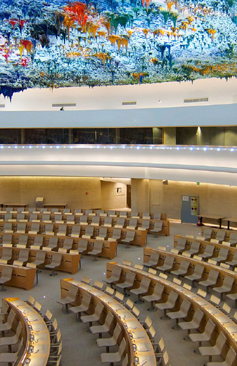
On Devolution: England should get what England wants – it’s time to find out what that is
‘You can be proud to be English and British’, Labour party leader Ed Miliband told his party conference. Yet the Labour leader ducked the question of England’s place within the next stage of devolution, instead warning that Prime Minister David Cameron’s raising of the issue of ‘English votes for English laws’ could divide the UK.
Labour’s complaint – that the Prime Minister’s raising the question of English votes for English laws was simply a partisan ambush – is unconvincing, because it fails to answer the key questions.
Any party which wants to be part of the conversation needs to decide what it is offering to England and the English.

Are we fighting a just war against the Islamic State?
This question is a little provocative so a clarification is in order. There is a distinction between whether a war is just (jus ad bellum) and whether it is being conducted in a just manner (jus in bello). In the case of IS it is incontrovertible that there is just cause for war. I have argued elsewhere that what is happening in IS occupied territory is attempted genocide. This legitimises military intervention, especially since the Iraqi government has requested help. What I wish to examine here is whether this war is being conducted justly.
Just war theory provides us with several principles that limit what is morally permissible in war. There are two principles that give us cause for concern when assessing the intervention against IS: proportionality and non-combatant immunity. The first of these is the idea that the means of war must be proportional to the ends. Soldiers should aim for victory, but this does not mean that victory can be pursued by any means necessary. There must be, to use Michael Walzer’s term, an ‘economy of force’ (Walzer, Just and Unjust Wars, 129-33). A general should not waste the lives of his soldiers in a bloody offensive when there are more economical means to victory. He should not resort to tactics that will produce longstanding bitterness and prolong the war (such as taking no prisoners).

Double standards on sex work in the EU: The ‘Nordic model’ criminalizes everyone.
The European Parliament (EP) recently voted in favor of a resolution that supports the so-called ‘Nordic model’ of sex work. With this decision from the 26th of February, the EP backs a report titled ‘Sexual exploitation and prostitution and its impact on gender equality’ that was proposed by Labour MEP for London Mary Honeyball. The purpose of the report was to send a “strong signal to domestic governments”. The document states that criminalizing the buying of sex while making selling of it exempt from punishment (as is currently the case in Sweden, Iceland and Norway), will decrease the demand for sex work. This is intended to reduce human trafficking for the purpose of sexual exploitation. In the EP’s report, the ‘Nordic Model’ is presented as a policy approach that aims to protect sex workers.
However, the Nordic approach does not improve the situation of sex workers. Instead, it indirectly leads to a criminalization of everyone involved in sex work – obviously including sex workers themselves. Criminalizing sex work increases the vulnerability of sex workers who chose this work because of economic necessity, strict immigration laws or personal preference. Moreover, it does not help those who are victims of human trafficking and have been forced into prostitution either, but instead decreases their visibility. Often portrayed as dominating the sex industry, the scale of the victims of human trafficking represents a minority of sex workers in the UK: less than 10% of female sex workers (2600 out of 30000) working indoors have been trafficked according to the Association of Chief Police Officers’ 2010 report.

The British constitutional reform crisis: a proposal
The UK needs a framework for federalisation. Here’s one suggestion for how this could work. The Problem Britain is on the brink of a catastrophe of which the left seems to be frighteningly unconcerned and unaware. If the Conservatives succeed in implementing English-only days at Westminster, it is likely to transform both Scotland and the rest of the UK into what will in effect be neoliberal dictatorships. Scotland will lose the ability to vote down proposals that would lead to steep cuts in its budget via Barnett consequentials if key services are privatised south of the border. English voters who may have voted Conservative or UKIP for ‘protest’ reasons such as concern about immigration or dislike of the EU could …

Is bombing ISIS atrocity prevention or a token gesture ?
Last week, the UK government voted, by a huge majority of 481 MPs, to engage in military action in Iraq. Now, once again, we are effectively at war in the Middle East.
For anyone committed to humanitarian inclinations, military force – so easily legitimated through hyperbolic statements of threat, and dramatic images of missiles precisely destroying targets through an aircraft’s gun-sights – should be treated with deep scepticism. Yet the tendency to reflexively reject and virulently condemn military action out of hand is no less lacking in critical reflection than the mindless swallowing of hawkish hyperbole.
The international community has rightly been condemned for standing by and allowing genocide to occur in Rwanda in 1994, and in Darfur in 2003. Is this a similar case? The unfolding and deepening disaster in Iraq seems very much of our own making; so will inaction make us again culpable in unspeakable human suffering? Or is the impulse to fight mere atavistic “war fever”?[1] To answer these questions we need to interrogate two more: first, is the threat of ISIS as great as is claimed? And second, will military action do any good?

Is the Islamic State committing genocide?
Recently I had a chance to visit the Christian community of Tur Abdin in Eastern Turkey, a long standing community. The monasteries where I stayed dated to the 5th century AD. The people are generous and welcoming, but there is certainly a feeling of isolation and anger in the community as well. You can see Syria stretching out in the distance from the Mor Hananyo Monastery. The people have family and friends in Syria and Iraq. These are the Christians who have been subjected to the brutality of the Islamic State (IS) along with the Yazidi, Shabak and Shia people of the region. Yet, this is nothing new to the people of Tur Abdin.
The monasteries, with their austere beauty and clockwork way of life, give the impression of tranquility. The reality is that this region of the world has been subjected to repeated instances of inter-ethnic and inter-religious conflict. All but one of the people I spoke about the region and its history had lost family in the pogroms of the late 19th century, the terrible bloodletting that accompanied the collapse of the Ottoman Empire, down to the recent conflict between Ankara and the Kurds. Violence is woven into the historical fabric of life in Tur Abdin.
The people are horrified and scared of what is happened a few kilometers from their homes, but they do not expect anyone to help. They’ve seen this before. The international community condemns, prevaricates and retreats. Admittedly, things are starting to happen. Airstrikes against IS have escalated and now include strikes in Syrian territory. Greater assistance is being given to the Kurdish Peshmerga, moderate Syrian forces and the Iraqis. However, this is insufficient. The world needs to decisively intervene in this conflict because the Islamic State is attempting to commit genocide against the minorities in their territory and we all have an obligation to stop them.

The Social Contract 2.0: Big data and the need to guarantee privacy and civil liberties
Much has been written regarding the rate of technological innovation and how these advancements might provide solutions to the emerging challenges facing humanity in the 21st century and beyond.A number of new technologies raise questions of our relationships to these technologies, and will be crucial to consider in terms of their sociological and cultural impact. Ultimately we must consider how specific technologies might either preserve or threaten human dignity, and thus what sorts of empowerment or regulation will be most appropriate. The integrity ofthe social fabric at various strata relies upon—often unspoken—understandings held in common by individual members of those social strata.
The idea of a social contract has a long history, dating back to various ancient cultures, ranging from the ancient Egyptians, Hammurabi, Greek, Roman, Chinese, Indian and the traditions of the three monolithic religions, Judaism, Christianity and Islam. However, a more recent exploration started with Grotius, Hobbes, Locke and, of course, Rousseau, who explored the limits of individual freedom, and the power of the sovereign. From Locke`s conception of the state as a “neutral judge”, to Rousseau, Rawls and others, all perspectives of the social contract ultimately seek to explore why rational individuals would consent to give up some of their freedoms as a trade-off for living in a political order.
A common thread in the social contract theory is the assumption that the state and political order exist for the general interest of the people, where life, liberty and property can be protected. What does this mean in an age of rapidly emerging technologies, Big Data, intense mobility and deepening connectivity and interdependence that transcend normal sovereign borders? Now seems to be an appropriate time to reassess some of our long-held credos about our liberties, the functions of the sovereign and the limits of control.

The risk of trivialising international law
The appointment by the United Nations Human Rights Council of a special commission to investigate Israeli actions during the latest war in the Gaza Strip seems to confirm the skepticism with which that organization is held by many people in North America and Europe.
The UN Human Rights Council replaced in 2006 the UN Human Rights Commission. Unfortunately, the change in name was not followed by a change in attitude.
The obsessive concentration on Israel, at the expense of many other countries where human rights are flagrantly violated, is not the exclusive purview of the UN Human Rights Commission, to be sure. The UN in general tends to devote more time to Israel than to any other country; so much so that one wonders if Israel did not exist what would the UN do with so much spare time left.









